A regional lockout is a class of digital rights management preventing the use of a certain product or service, such as multimedia or a hardware device, outside a certain region or territory. A regional lockout may be enforced through physical means, through technological means such as detecting the user's IP address or using an identifying code, or through unintentional means introduced by devices only supporting certain regional technologies.

The Rumble Pak is a removable device from Nintendo which provides force feedback while playing video games. Games that support the Rumble Pak cause it to vibrate in select situations, such as when firing a weapon or receiving damage, to immerse the player in the game. Versions of the Rumble Pak are available for the Nintendo 64, the Nintendo DS, and the Nintendo DS Lite. A select few Game Boy Color and Game Boy Advance (GBA) games use a similar technology built into the game cartridge. Force feedback vibration has become a built-in standard feature in almost every home video game console controller since.

SubSpace is a 2D space shooter video game created in 1995 and released in 1997 by Virgin Interactive which was a finalist for the Academy of Interactive Arts & Sciences Online Game of the Year Award in 1998. SubSpace incorporates quasi-realistic zero-friction physics into a massively multiplayer online game.
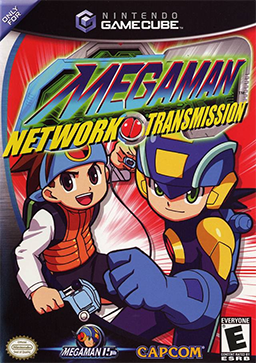
Mega Man Network Transmission is a 2003 action-platform video game developed by Arika and published by Capcom for the GameCube video game console. The game was first released in Japan on March 6, 2003, and in North America and PAL regions the following June. Network Transmission is part of the Mega Man Battle Network series, which originated on the Game Boy Advance (GBA) handheld and takes place in an alternate timeline to the main Mega Man series.
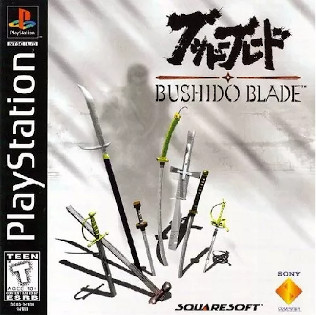
Bushido Blade is a 3D fighting video game developed by Lightweight and published by Square and Sony Computer Entertainment for the PlayStation. The game features one-on-one armed combat. Its name refers to the Japanese warrior code of honor bushidō.
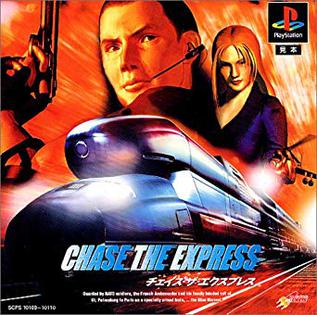
Chase the Express, known in North America as Covert Ops: Nuclear Dawn, is a video game created by Sugar & Rockets for the PlayStation, and released in 2000. On March 16, 2000 Activision announced that they had acquired the North American publishing rights to Chase the Express. The game was then renamed Covert Ops: Nuclear Dawn for the North American market.
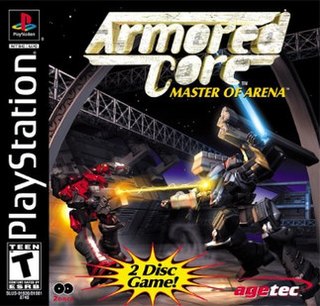
Armored Core: Master of Arena is a 1999 third-person shooter mecha video game developed by FromSoftware for the PlayStation. Master of Arena is the third entry in the Armored Core series and a direct sequel to Armored Core: Project Phantasma. It is the final game in the original Armored Core trilogy. The game was not released in Europe. An indirect sequel, Armored Core 2, was released on August 3, 2000, for the PlayStation 2.

Phantasy Star Online Episode III: C.A.R.D. Revolution is a turn-based role-playing video game released for the GameCube in 2003. It has a card-based play style, making it unique among games in the Phantasy Star Online series. The story of the game takes place twenty-one years after the fourth episode, itself set after the first two episodes.

Digimon Rumble Arena is a 2001 fighting video game developed and published by Bandai. It is part of a video game series connected to the Digimon franchise and showcases the titular creatures within the context of a fighting video game. The player controls one of several Digimon and engages in combat with other Digimon within a variety of settings. Apart from the central fighting gameplay, a trio of mini-games are available upon the single-player campaign's completion.

Digimon Rumble Arena 2, known as Digimon Battle Chronicle in Japan, is a 2004 Digimon fighting video game, released by Bandai for the PlayStation 2, GameCube, and the Xbox. It is the sequel to 2001's Digimon Rumble Arena and has a similar style of gameplay as Super Smash Bros. Melee, except with a health meter. Digimon All-Star Rumble, a spiritual successor to the Rumble Arena games, was later released in 2014.

Phantom Crash is a 2002 video game developed by the Japanese game studio Genki and published by Phantagram exclusively for the Xbox. The game is a vehicular combat game in which players enter competitive combat using mecha named Scoot Vehicles, using the winnings of events to customise and upgrade the capabilities of their vehicles. Upon release, Phantom Crash received average reviews, with praise directed to the game's level of detail in its vehicles and customisation features, whilst critiquing the large levels of dialogue and lack of stages and multiplayer options. In 2005, Genki released a sequel exclusively for the PlayStation 2, titled S.L.A.I.: Steel Lancer Arena International.

Guild Wars is a multiplayer online action role-playing game developed by ArenaNet, a subsidiary of South Korean game publisher NCSOFT, and released in 2005. As the original installment of the Guild Wars series, its campaign was retroactively titled Prophecies to differentiate it from the content of subsequent releases. The game contains a co-operative role-playing portion and a competitive Player versus Player (PvP) portion. In PvP, players may use either their co-operative characters or PvP-exclusive characters who are inherently maximum level and have account-based access to unlocked content.
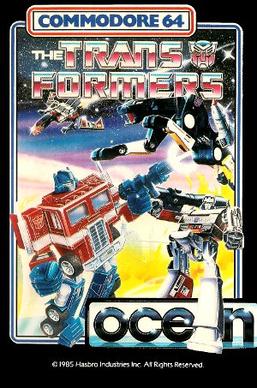
The Transformers is a platform shoot 'em up game based on the Transformers franchise. It was written by Denton Designs and released by Ocean Software for the Sinclair Spectrum and Commodore 64 home computers in 1986.
Atlus's 2006 role-playing video game Persona 3 focuses on the exploits of the Specialized Extracurricular Execution Squad (SEES), a group of high-schoolers defending their home city from monsters known as Shadows. Persona 3 is set in a fictional Japanese city in the year 2009. Due to past events, there is a hidden period between one day and the next, known as the "Dark Hour", during which most people become unconscious, and Shadows feed on the minds of those still aware of their surroundings. In addition, a large tower called Tartarus, filled with Shadows, rises out of the ground during the Dark Hour. SEES is composed of students attending Gekkoukan High School. The player names and controls the game's protagonist, who leads SEES in its exploration of Tartarus. Persona 3 mixes elements of role-playing and simulation games: during the day, the player attends school, and is able to spend time with other characters, forming relationships known as Social Links. These Social Links, when formed, have gameplay benefits, increasing the player's proficiency in battle.
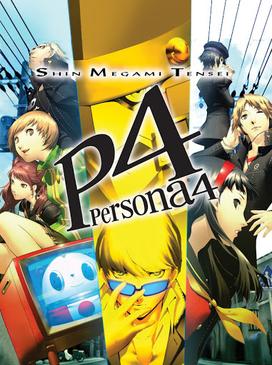
Persona 4, released outside Japan as Shin Megami Tensei: Persona 4, is a 2008 role-playing video game by Atlus. It is chronologically the fifth installment in the Persona series, itself a part of the larger Megami Tensei franchise, and was released for the PlayStation 2 in Japan in July 2008, North America in December 2008, and Europe in March 2009 as one of the final major exclusives for the system. It was re-released as a PlayStation 2 Classic for the PlayStation 3 in April 2014. Persona 4 takes place in a fictional Japanese countryside and is indirectly related to earlier Persona games. The player-named protagonist is a high-school student who moved into the countryside from the city for a year. During his year-long stay, he becomes involved in investigating mysterious murders with a group of friends while harnessing the power to summon physical manifestations of their psyches known as a Persona.

The plot of Atlus's PlayStation 2 role-playing game Persona 4 is centered on a group of high-school students dedicated to capturing the culprit responsible for the murders and kidnappings that happened in their small town of Inaba starting on April 11, 2011. The case is linked by the TV world, a dimension where the characters use alter-egos known as "Personas" to defeat the Shadows, beings that represent people's hidden thoughts that killed the first two victims. The protagonist is Yu Narukami, a high-school student who moved into the town from the city. He is met by Yosuke Hanamura, the son of the local department store manager; Chie Satonaka, an energetic girl with a strong interest in kung fu; Yukiko Amagi, a calm and refined girl whose family owns the local inn; Kanji Tatsumi, a first-year student whose punk reputation hides a softer side; Teddie, a mysterious figure from the TV world who exists in the form of a cartoonish bear costume; Rise Kujikawa, a popular teen idol who has taken a break from showbiz; and Naoto Shirogane, a well-known junior detective.

Zoids Infinity is a series of sci-fi shooter arcade games that can be used in conjunction with special swipe cards to unlock new features. Originally debuting in 2004 as a System 246 coin-operated arcade game from Taito in Japan.

Pokémon Rumble is a beat 'em up video game in the Pokémon series for WiiWare developed by Ambrella and published by The Pokémon Company and Nintendo.

Rappelz is a free-to-play massively multiplayer online role-playing game. The game was developed by the Korean company Gala Lab, formerly nFlavor. It is published in Europe and North America by Way2Bit Co. Ltd. and Gambit in English, French, German, Italian, Polish, and Turkish, on their Bora Island games portal. As of October 2008, Rappelz was also being published by the South East Asia-based game publishing company AsiaSoft as RappelzSEA but was later dropped by the company on 1 September 2009. The game was also published in Arabic for MENA gamers by the Emirati company Game Power 7. The game was released under a different title known as Hope of Nations, and was commercially launched on 16 March 2009. A new version was released on 15 July 2010 by EagleGame in the Philippines, but the PH/SEA version closed in 2016. As of 6 February 2013, it was confirmed by Rappelz GMs that "Gala Net, Inc. and its subsidiaries Gala Networks Europe and Gala-Net Brazil have been acquired by Webzen, Inc.", however, it is still being developed by Gala Labs and Gala Japan
Trove is a voxel-based sandbox game developed and published by Trion Worlds. The game was released for Microsoft Windows and macOS in July 2015, and for PlayStation 4 and Xbox One in March 2017 and Nintendo Switch in June 2021.

















